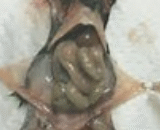
Peritoneal fibrosis is one of the most serious complications of peritoneal dialysis, and is characterized by the activation of peritoneal resident cells, induction of pro-fibrotic peptides, accumulation and deposition of excess matrix proteins within the submesothelium, and vasculopathy of the peritoneal microvasculature. Peritoneal fibrosis is a serious complication in patients with end stage renal disease (ESRD), especially those undergoing long-term peritoneal dialysis therapy. Since the peritoneum is a major site of mast cell accumulation, and since mast cells are known to facilitate the progression of organ fibrosis, they would also contribute to the pathogenesis of peritoneal fibrosis.
Organism species: Mus musculus (Mouse)
| CATALOG NO. | PRODUCT NAME | APPLICATIONS | |
| Models | DSI819Mu01 | Mouse Model for Peritoneal Fibrosis (PF) | Used to study the process and pharmacodynamics of peritoneal fibrosis |
| Tissues | n/a | Tissue of Peritoneal Fibrosis (PF) (If Necessary) | Tissue Customized Service Offer |
| Serums | n/a | Serums of Peritoneal Fibrosis (PF) (If Necessary) | Serums Customized Service Offer |
Organism species: Rattus norvegicus (Rat)
| CATALOG NO. | PRODUCT NAME | APPLICATIONS | |
| Models | DSI819Ra01 | Rat Model for Peritoneal Fibrosis (PF) | Disease Model |
| Tissues | n/a | Tissue of Peritoneal Fibrosis (PF) (If Necessary) | Tissue Customized Service Offer |
| Serums | n/a | Serums of Peritoneal Fibrosis (PF) (If Necessary) | Serums Customized Service Offer |
